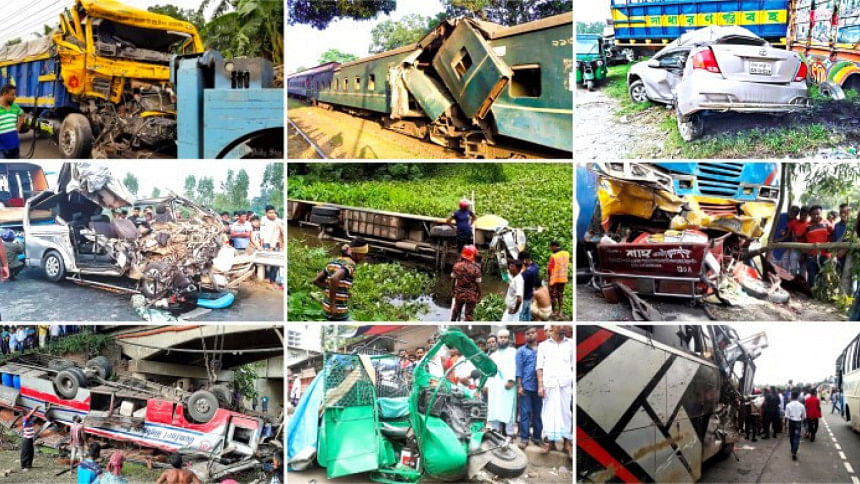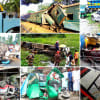Can we ensure road safety this Eid?

As the nation prepares for Eid-ul-Azha, millions of people will soon begin their journey home, eager to reunite with family and celebrate together. However, such journeys often turned tragic in the past. Year after year, the Eid travel rush brings with it an alarming spike in road accidents, injuries, and deaths.
This year's Eid-ul-Fitr holiday was no different. According to data from the Road Safety Foundation, at least 257 accidents occurred between March 26 and April 5, resulting in 249 deaths and more than 2,000 injuries. These are not just statistics—they are shattered families, stolen futures, and preventable tragedies. It is time we stop accepting this loss of life as a normal part of our festive seasons.
According to the World Health Organization, over half of global road traffic deaths involve pedestrians, cyclists, and motorcyclists. In Bangladesh, this rings painfully true. The most vulnerable road users pay the highest price for a system riddled with weak enforcement, outdated infrastructure, and public indifference. The problem becomes even more pronounced during national holidays, when roads are flooded with vehicles, and reckless behaviour among riders becomes commonplace.
Safety gear, dedicated lanes, awareness campaigns
A simple yet lifesaving step is enforcing the use of standard helmets for both motorcycle riders and passengers. Too often, passengers—especially women and children—ride unprotected. It is not just illegal; it is deadly. Authorities must implement a directive requiring certified helmets, while awareness campaigns should reinforce the importance of compliance.
At the same time, highways and major roads must have dedicated lanes for motorcycles to reduce collisions. These structural changes can save lives by separating vulnerable road users from high-speed traffic. Meanwhile within cities, Walking or cycling could be practical alternatives—but only if they are safe. We must invest in pedestrian- and cyclist-friendly infrastructure, such as footpaths, protected bike lanes, zebra crossings, and foot-over bridges. This year's UN Global Road Safety Week theme "Roads for Life: Making Walking and Cycling Safe" reminds us that the solution is not only about better driving but also about better design.
During Eid, the urgency to reach home quickly often leads to speeding and reckless overtaking. These behaviours are among the top causes of fatal accidents. Authorities must introduce and enforce strict speed limits, particularly on highways, during holiday periods. Law enforcement agencies need clear directives, supported by mobile courts and highway patrols, to monitor driver behaviour more closely.
Driver fatigue is another hidden killer on our roads. Long-distance drivers often work without rest, risking not only their lives but also those of their passengers and others. We must introduce regulations that limit driver's working hours and ensure that rest periods are enforced.
Similarly, outdated vehicles and those without fitness certificates should be removed from the roads. Battery-powered vehicles like Nosimon and Korimon must be barred from operating on highways during peak travel times. On other roads, clear lanes for slow- and fast-moving vehicles should be established to prevent dangerous interactions.
However, road safety measures must extend beyond drivers. All passengers should be required to wear seat belts. For cars, jeeps, and microbuses, laws must mandate child safety seats. Children are among the most vulnerable passengers, and protecting them is non-negotiable.
Pedestrians, too, deserve better. Public campaigns should promote the use of footpaths, discourage the use of mobile phones while crossing roads, and increase awareness of zebra crossings. These small behavioural shifts, when supported by proper infrastructure, can dramatically reduce accidents.
To coordinate these efforts effectively, Bangladesh needs a centralised body dedicated solely to road safety. A National Road Safety Authority would streamline enforcement, infrastructure planning, public education, and policy development under one roof.
We cannot rely on scattered departments and uncoordinated efforts. Road safety requires unified action, sustained funding, and political will.
Every death on the road is a failure of planning, enforcement, and accountability. And every Eid that ends in mourning is a reminder of how urgently we need change.
The solutions are known. The data is clear. The tools exist. What's missing is the collective resolve to act.
Let this Eid be remembered not as another chapter in a long line of preventable tragedies—but as a turning point. Let it mark the beginning of a national commitment to making our roads safe for everyone, every day of the year.
Tamanna Mizan is senior communications officer of Road Safety Programme at BRAC.
Views expressed in this article are the author's own.
Follow The Daily Star Opinion on Facebook for the latest opinions, commentaries and analyses by experts and professionals. To contribute your article or letter to The Daily Star Opinion, see our guidelines for submission.

 For all latest news, follow The Daily Star's Google News channel.
For all latest news, follow The Daily Star's Google News channel. 







Comments